Rob Harrison is a fellow writer. I am amazed how he turns his memories into these vivid stories. Here’s his latest.
A Ranch Boy’s Memory
By Rob Harrision
I remember a night where nothing out of the ordinary happened. Pete, his father and I took shifts checking the cows. Pete shook me awake and made sure I was out of bed. I stumbled down steep stairs. The warm kitchen smelled of a banked wood fire smoldering in the cook stove and strong old coffee simmering in a pot. I put on insulated coveralls, large felt-insulated boots, and a heavy hooded wool coat. I swallowed a few sips of bitter coffee and headed for the barn. The snow squeaked underfoot, punctuating the frozen stillness.
In the dusty old log barn, the sturdy gray mare turned her head toward me as far as the halter rope would allow. The whites of her eyes showed in the dim light of the single flyspecked bulb. She was already saddled. I slipped on the bridle and tightened the cinch. Outside, it was tricky getting on the horse with the clumsy boots on my feet – they wouldn’t go into the stirrups, but a fence rail helped me get aboard. From there, I did nothing; this little horse could walk the circuit of the calving field in her sleep.
The night was a dimly lit Arctic still-life – ten below, maybe twenty – no wind at all. I felt the hairs in my nose freeze as I inhaled. The stars shone as a milky blanket of lights, not close enough to touch as is often written, but tiny pinpoints far away like they get when it’s that cold. The foothills of the Rockies lay half a mile away and, after my eyes adjusted, I could make out individual trees without moonlight.
The cows stepped aside as I rode through, wet noses lifted to me with only mild interest. This time there were no cows in labor and no calves to deal with. If there had been a new calf, I would have herded the cow and calf into the lean-to. If something seemed wrong with the calf, I would have taken it, across the horse in front of me, to the house where there was a big box with blankets next to the kitchen stove. The cow would follow and be put into the milk cow corral. None of that happened.
In three months, these cows and their calves, along with the bulls, would be taken to summer pasture on the forest grazing allotment. I liked to think of the bulls as smoking cigars and playing poker all winter in the bull pasture. When the bulls were let out with the cows, this cycle of life would begin again. I thought it marvelous that two hundred cows needed only five or six very busy bulls for procreation. Happily worn out in the fall, they would go back to their cards and cigars.
I sat the horse, feeling her muscular stride under me, listening to the crunch of her steps in the crusted snow. When the snow was off, she would join the other horses. I remembered the joy of their nickering when they met in the summer pasture, how they ran, their necks pushing against each others’, turning suddenly as one, then running again, finally stopping to sample the new grass.
It became clear as the crystalline air that this winter, this sleepy waiting, was giving way to a season of feverish, joyous creation. I was sixteen then and could feel the ageless forces welling up in me. Nature would have her way and I would relish the reckless spring of my life.
Take a look at Rob’s story posted on December 30.
Take a look at Rob’s story posted on December 30.



Takes me back to the prairies!